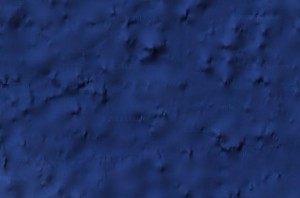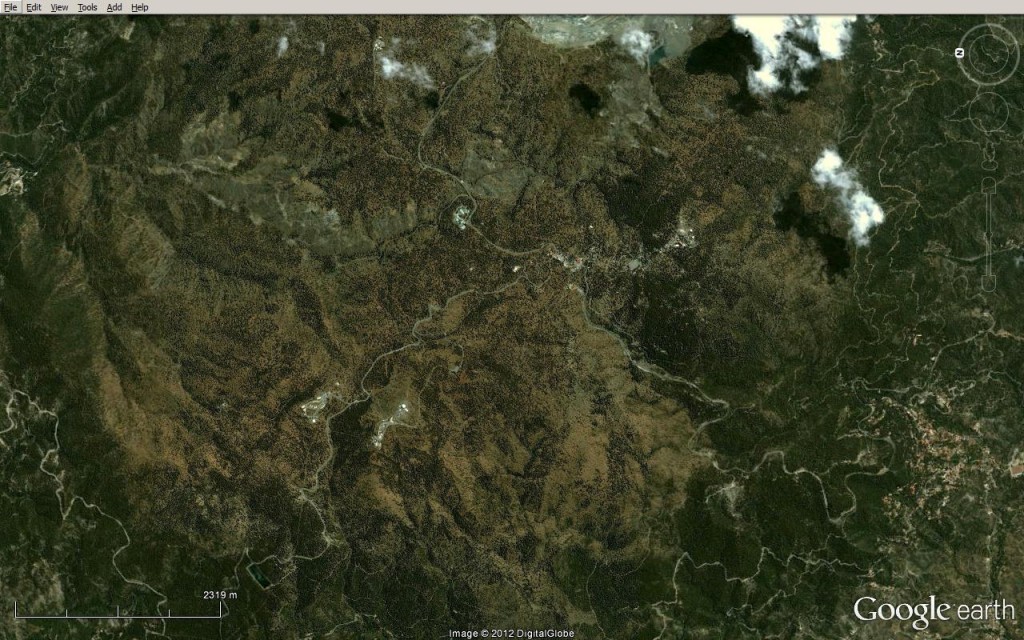Christoph’s lovely view of fractal patterns in the Scheldt estuary took a while to find, but his hint made me think of European estuaries and I happened to start in the West….
I’ve given up guessing how hard my Where on Google Earth pictures are going to be to find so I’ve not much to say about it, for the moment. Schott Rule does apply, in case this one is easy to get. If you don’t know what the Schott Rule is, you don’t need to worry about it.
Rules are best expressed here, but in summary, look at the entire Earth’s surface until you find the area shown in this picture. Then find out about its Geology. Then add the location and Geological description in the comments.
It’s nearly been a fortnight, so time to drop some subtle hints, I think. An interesting fact: a mate of mine found this within half an hour, but doesn’t want to claim the credit. Also he had an advantage: his PhD field area was near Ronda. NB see Felix’s comment below, he’s on the right lines.
Hint #2, here is a screenshot of an area of the world where the same rocks can be found (but not on the surface). Once you find the main picture, you’ll find it’s a classic.



Simon, my ex-colleague Heijn from the Netherlands posted a lot more hiostorical information on the estuary you detected, it’s really worth a look:
http://www.paleoseismicity.org/blog/2012/01/10/where-on-googleearth-woge-327/
Cheers,
Christoph
Simon: I am sure everybody would be enthusiastic to have somebody new on board! So it would be great if your mate would claim the game.
I agree and I’ve tried persuading him, but I think he is too busy to think of the next WoGE. Also I think he is worried he will get addicted.
Unless he changes his mind, there’s not much I can do.
If you think we are stuck, I can gradually add more hints. Let me know.
If I look at my blog statistics, I think we are not stuck by the lack of hints, we do not move fast at the moment, as everybody is generally a little tired right now. I do have the feeling as if we should post some easy to find WoGEs in the next future. The hint with Ronda should be very helpful. A wonderful city by the way. As far as I remember my visit, the town sits spectacular on top of some sort of a platform/cliff with a great view over the country.
Oh, Ronda! There’s also that amazing bridge crossing the canyon! Great place.
I think Simon’s hint is not as easy as it seem as I did not find it in Spain. If you google “Ronda and geology”, you find “Peridotite”. So the question could be, where else do we have an outcrop of Peridotite. This is something for the educated geologists…..
Simon, your hints really helped! I’d looked before they were up and given up, but the clue about Ronda plus the pic of the ocean floor were all I needed to think ophiolite!
N 34 degrees north, 55 minutes 23 seconds. E 32 degrees, 52 minutes, 51 seconds.
We are centered on the Troodos, Cyprus, on the Troodos ophiolite, which was formed during the collision of European and African plates. Looks like googling Troodos ophiolite will give you lots more information.
Congratulations to Anne!
Indeed I chose the Troodos ophiolite, which in some ways is the classic ophiolite as it was the site of classic work of Ian Gass in the sixties.
I tried to ensure that the picture included the Moho, something normally hidden 10s of kilometres under the surface.
See this rather nice map: http://www.moa.gov.cy/moa/gsd/gsd.nsf/All/43CA34467BC412EAC2256FB30035287E/$file/GeologicalMapOfCyprus_250k_en.jpg?OpenElement
I look forward to seeing what Anne will choose.
Pingback: Where on Google Earth #329 | Highly Allochthonous
And here’s number 329: http://all-geo.org/highlyallochthonous/2012/02/where-on-google-earth-329/.